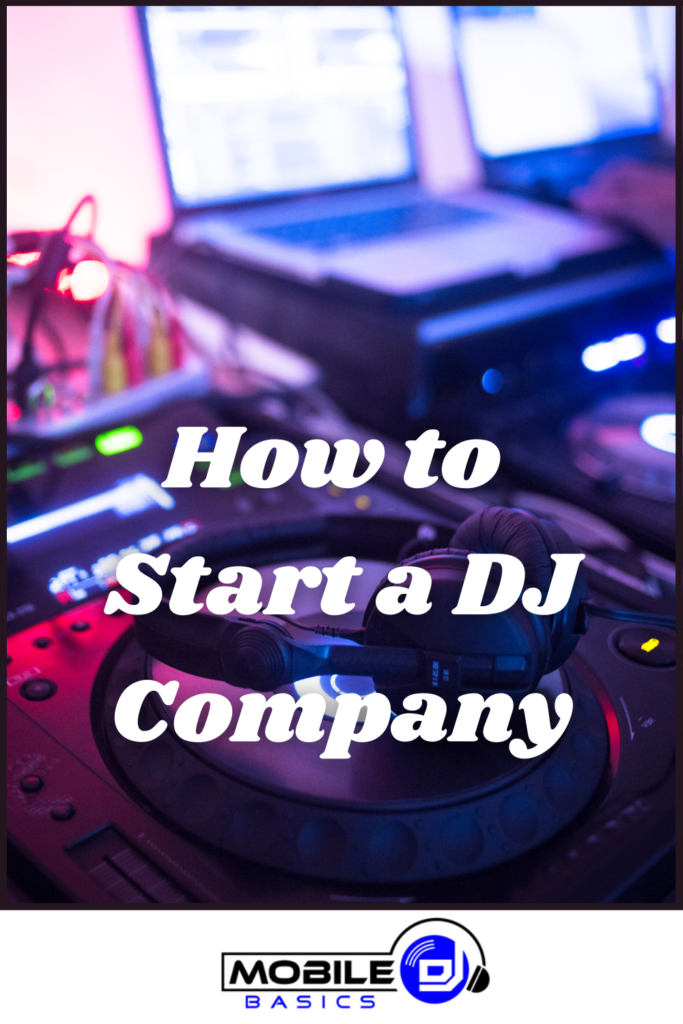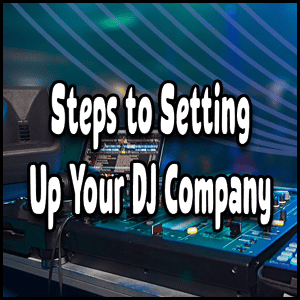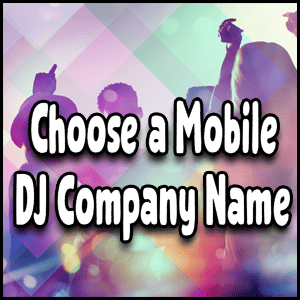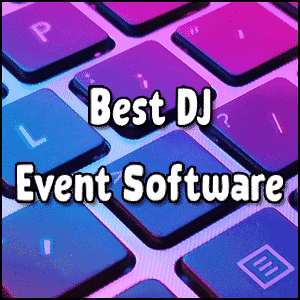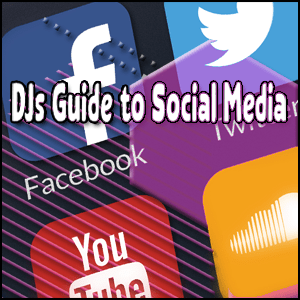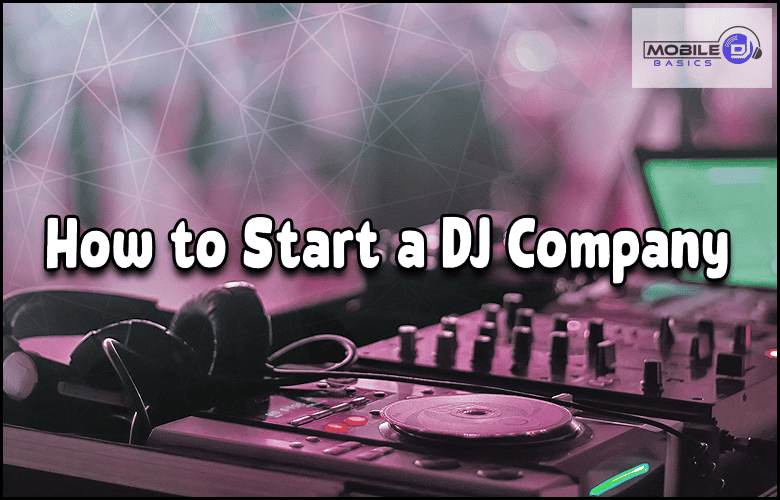
Are you someone who loves music and wants to make money with it? Starting a DJ business can be both fun and rewarding. It lets you share your talent, make people happy, and create memories. We’ll guide you on how to start your own DJ company successfully.
Our Main Points:
- Starting a DJ business requires careful planning and execution.
- Ensure you have the necessary DJ equipment, including turntables, DJ controllers, speakers, and headphones.
- Build a diverse music library by acquiring legal music tracks and organizing them effectively.
- Continuously develop your DJ skills through practice, learning, and staying updated with industry trends.
- Create a strong brand identity through a memorable business name, professional website, and consistent branding.
What is a DJ Business?
A DJ business focuses on offering DJ services for many events. This includes weddings, parties, corporate functions, clubs, and festivals. DJs are experts who mix music, handle equipment, and read the crowd well. Their aim is to keep the vibe lively by smoothly shifting from one song to another.
The main act at a DJ business is, of course, the DJ’s performance. They pick and play music that fits the event and keeps the guests excited. DJs do more than just play tunes. They also gauge the audience’s feelings, change the playlist when needed, and ensure the fun never stops.
On top of the DJ services, these businesses offer extra features to boost the event’s impact. For example, they may provide lighting to spruce up the venue, quality sound equipment for a better auditory experience, and can even help plan the event. These added services aim to make the client’s event unforgettable.
Key Services Offered by a DJ Business
- DJ services for weddings, parties, corporate functions, clubs, and festivals
- Seamless song transitions and crowd engagement
- Lighting equipment rental for captivating visual effects
- Sound equipment rental for optimal audio quality
- Event planning assistance for seamless event execution
DJ businesses are key in making events like weddings, parties, or dance festivals a hit. Their talent in mixing music, feeling out the crowd, and working in diverse settings is vital. This makes them a valuable part of the entertainment scene.
Can a DJ Business Be Profitable?
Starting a DJ business can lead to profit. Success depends on many things working well together. These elements help make a strong and steady income.
How much people need your services is key. This depends on where you are and what entertainment is like there. Do your homework to know if people in your area want DJ services.
Use the right marketing strategies to grow your DJ business. Target your ads, be active on social media, and team up with event organizers and places. This way, more people will know about you, bringing in more business.
“Providing exceptional DJ services is vital to the success and profitability of your business.”
Setting the right price is very important. Look at your competition, what people need, and the quality you offer to decide what to charge. Also, offer different service packages to meet various budgets and needs. This can help you earn more.
Being top-notch in service is a must. Give clients a great time with good sound, smooth music changes, and a mix that fits their event. Also, connect with others in the field, make friends, and get referrals. This will help bring in new clients, making your business more profitable.
Find what makes you special. Stand out by focusing on a specific service or event type, like weddings. This sets you apart from others and attracts your ideal clients.
Remember, events have different busy times. Weddings, for example, are more common in summer. Be aware of these trends and plan for them. This helps you keep a steady flow of work all year long.
Increasing DJ Business Profitability: Key Takeaways
- Thoroughly research market demand for DJ services in your area.
- Develop effective marketing strategies to increase visibility and attract clients.
- Consider factors like competition, demand, and the value you provide when setting prices.
- Focus on delivering top-quality service and network with professionals in the industry.
- Discover and emphasize what makes your DJ business unique.
- Plan how to manage changes in event demand throughout the year.
DJ Business Profitability Factors
| Factors | Description |
|---|---|
| Market Demand | The level of demand for DJ services in a specific location and entertainment scene. |
| Marketing Strategies | Effective techniques to promote and attract clients for a DJ business. |
| Pricing | The structure of pricing for DJ services, taking into account competition and value delivered. |
| Service Quality | The level of excellence and professionalism in providing DJ services. |
| Networking | Building relationships with industry professionals and receiving positive referrals. |
| Unique Selling Proposition | The distinct characteristics and value proposition that set a DJ business apart from competitors. |
| Seasonality of Events | Understanding and planning for fluctuations in event demand throughout the year. |
Essential Steps to Start a DJ Business
Starting a DJ business takes planning and follow-through. Use these six steps to get yourself started:
1. Define Your DJ Business Concept
Start by defining what your DJ business is about. Choose the events you will focus on, such as weddings, parties, or clubs. Knowing your audience and the value you bring will set you apart in the DJ world.
2. Acquire the Necessary DJ Equipment
Good DJ equipment is a must for great shows. You’ll need controllers, turntables, speakers, and more. Think about your budget and what your target clients need to pick the best gear.
3. Build a Comprehensive Music Library
A big, varied music library is essential for DJs. Pick different genres for all kinds of events. Make sure your music is legal, and keep it organized for easy access.
4. Develop Your DJ Skills
Getting better at DJing takes practice. Work on your mixing and effects. Take classes and keep up with new trends to be the best DJ you can be.
5. Create Your Brand Identity
Building your brand sets you apart and draws in clients. Pick a unique business name and get all the legal stuff done. Use social media and a website to show off your work. A cool logo and unified branding help too.
6. Network and Collaborate with Industry Professionals
Networking is vital for growing your business. Shake hands with event planners and other DJs. Join associations and help each other out. Good relationships and word of mouth are powerful tools.
Stick to these steps and you’ll be off to a great start. Keep improving your skills, putting on great shows, and spreading the word. This will build you a strong base of happy clients.
Acquiring the Necessary DJ Equipment
Getting the right DJ equipment is key for starting your business. The perfect gear helps you perform well. It’s essential to choose equipment that fits your budget and goals.
Basic DJ Equipment
Every DJ needs the following to set up:
- Turntables: These are for vinyl DJs who love the old-school sound. They offer precise control and are popular with pros.
- DJ Controllers: They bring turntables and mixers together in one piece. Great for digital DJs, they work with software and offer lots of features.
- Speakers: Good speakers make sure your music sounds top-notch at events. Pick the right ones for the venues you’ll play, from small weddings to big festivals.
- Headphones: Headphones are a must for matching beats and keeping track of your music. Find a pair that sounds accurate and feels good to wear all day.
- Mixer: The mixer lets you blend songs and control various sources of audio. It’s where you make your music flow without a hitch.
Enhancing Your Setup
On top of the basics, consider adding these to your setup:
- Lighting Effects: Cool lights can make your shows more exciting. Choose from bright LEDs to machines that make fog to set the mood right.
- Microphones: If you’re MCing or hosting, a quality microphone is a must. Look for one that makes you sound clear and loud to your audience.
- Music Production Software: With the right software, you can create your own tracks and remixes. It adds a new layer of creativity to your DJing.
Always put quality and reliability first when you shop for DJ gear. Look for well-known brands and check out what others say in reviews. Your equipment is an investment in your business. And, having gear you can rely on sets you up for success in the DJ world.
Building a Music Library
Creating a big and varied music library is key for a DJ’s success. It should have many genres to please all listeners. This makes your events fun and keeps people interested.
Make sure you get music legally to avoid problems. Stick to trusted sources for your songs. This way, you follow the law and entertain safely.
Try music streams with special rights for DJs. They have a wide array of songs just for you. Pick a good streaming service made for DJs. They have the features you need.
Keep your music well-organized. Use special DJ software to sort your music by type and speed. This makes finding the perfect song easy. Then, your mixes will be flawless.
Benefits of a Organized Music Library
An organized music library is a great help. It lets you find songs fast, which is handy during shows. You can switch between different music styles smoothly.
Also, it helps you make playlists for special events. This is great for giving each audience what they like. It ensures everyone has a blast.
“Having an organized music library is a game-changer for DJs. It gives you the ability to curate sets on the fly and adapt to the energy of the crowd seamlessly.” – DJ Sarah Thompson
Finally, it keeps you updated on the latest tunes. You can share new songs with your fans. This keeps your music fresh and always exciting.
Work on your music collection to stand out. It will help you give your best to the people you entertain. Plus, it builds your name in the business.
Developing Your DJ Skills
Improving your DJ skills is crucial for success. It’s more than just loving music. To be a great DJ, you need to keep learning and practicing. By perfecting your mixing, mastering smooth transitions, and trying out effects, you can improve your shows.
“The more you practice, the better you become. Never stop learning and experimenting with new techniques.”
Attending workshops is one good way to get better. They’re usually led by experts and are very hands-on. You can learn a lot, meet other DJs, and have fun.
Another option is online courses. They’re flexible and let you learn at your own pace. You can find detailed tutorials and tips on the latest trends online.
It’s important to keep up with what’s new in the music world. Stay current on trends, tracks, and techniques. By doing this, you can keep your audience interested and make your shows unforgettable.
Benefits of Continuous Learning and Practice
- Refinement of DJ skills: Practicing helps hone your skills in reading crowds and creating great sets.
- Expanded repertoire: Learning new techniques lets you play more types of music. This means you can appeal to a wider audience.
- Enhanced creativity: Trying new things boosts your creativity. It helps you develop a distinct style that stands out.
Remember, getting better at DJing is a journey. Always be open to learning, getting feedback, and looking for ways to improve. Practice, go to workshops, take online classes, and keep an eye on trends. These efforts will take your DJing to the next level.
Creating Your Brand Identity
Creating a strong brand identity is key for a successful DJ business. It makes your company stand out and impresses clients. Here’s how you can start building your brand identity:
Choose a Memorable Business Name
It all starts with a unique business name. Make sure it shows your style and connects with your audience. A catchy and relevant name is important for the DJ world.
Register Your Business as a Legal Entity
Registering your DJ business as a legal entity is important. This keeps you legal and opens the door to tax benefits and protections.
Obtain the Necessary Licenses and Permits
Get the right permits and licenses for your DJ business to follow local laws. You might need a permit for music, for events, and even for serving alcohol if you run a bar.
Utilize Social Media Platforms
Use Facebook, Twitter, Instagram, and LinkedIn to grow online. These platforms help you share your gigs, music, and connect with more people. This builds your credibility and audience.
| Popular Social Media Platforms for DJs | |
|---|---|
| Engage with your audience through posts, live videos, and event announcements. | |
| Showcase your brand through visually appealing photos and videos of your performances. | |
| Share quick updates, news, and interact with fellow DJs and industry professionals. | |
| Connect with event planners, venue owners, and other industry contacts to expand your professional network. | |
Create a Professional Website
Have a professional website for your DJ business. It shows your services, experience, and makes it easy for clients to reach you. Design it well to reflect your brand.
Utilize Branding Tools
Use branding tools to make your brand look great and consistent. Things like logos, design software, and templates for your business materials keep your look professional. Consistent visuals build a strong brand identity.
Follow these steps to stand out in the DJ world and attract more clients. A unique brand identity, great DJ skills, and a strong network help you succeed in this busy industry.
Networking and Collaboration
Connecting with industry professionals is key to growing your DJ business. It’s essential to build strong relationships. Connect with event planners, venue owners, and more. This will help you get more bookings.
Industry events are perfect for meeting clients and making connections. At these gatherings, you can show off your skills. You’ll also learn about the latest in the DJ world and meet others with similar interests.
Join DJ associations to expand your network. These groups bring DJs together. You’ll get to share knowledge and experiences. Plus, you gain access to mentorship and educational resources. This can help boost your DJ business.
Working with other DJs can increase your reach. By teaming up, you can offer more to your clients. You’ll also get to know new people who can lead to more work. Remember, happy clients often pass on your name to others.
Word-of-Mouth Referrals
Word-of-mouth is huge for getting your name out there. When clients are happy, they’ll tell others about you. This boosts your reputation and can bring in more clients.
To get good recommendations, focus on making every event awesome. Keep the vibe alive with your music. Delivering great shows every time will make people want to tell others about you.
And it’s not just clients who can help spread the word. Build strong bonds with industry pros, too. They might recommend you to their clients. Showing you’re reliable and talented can lead to more referrals from these fellow pros.
| Networking Strategies | Collaboration Benefits | Referral Sources |
|---|---|---|
| Attending industry events | Increased reach and opportunities | Satisfied clients |
| Joining DJ associations | Knowledge sharing and professional development | Event planners |
| Collaborating with other DJs | Diversified service offerings | Venue owners |
| Collaborating with event planners and wedding planners | Referrals and repeat business | Wedding planners |
By using these networking and collaboration strategies, your DJ business will thrive. Build on your connections and deliver amazing service. It’ll help you succeed in the entertainment world.
Conclusion
Starting a DJ business can open doors to a fulfilling career. By using the steps in this guide and adding your own ideas, you could be on your way to success. Remember, doing well in this field means serious planning, getting ready, always getting better, and being professional.
As you start your journey, work on your DJ skills. Keep up with new music and tech, and build good connections. Advertise your business well on social media and with a good website. This way, you make sure the right people know about your brand.
With hard work and not giving up, you can build a great DJ company. There are many chances in the entertainment world for skilled DJs. Be ready to adapt and make the most of these opportunities. Good luck on your adventure to shine in this ever-changing industry!
FAQ
What is a DJ Business?
A DJ business plays music for events like weddings, parties, and clubs. They make sure the music flows well, read the crowd, and keep the fun going. Some also offer lights, sound gear, and help plan the event.
Can a DJ Business Be Profitable?
This depends on how well you meet the area’s DJ needs, and how you stand out. Networking, strong skills, and a unique touch can help. Yet, remember, the business may slow down at certain times.
What are the Essential Steps to Start a DJ Business?
Key steps include knowing what makes your business special, getting the right gear, and growing your music collection. You should also learn and improve your skills and connect with other pros in the field.
What DJ Equipment is Necessary to Start a DJ Business?
You’ll need items like turntables, speakers, and headphones, and software. Extra gear such as lights and a mic make your service better. Choose well-made gear that fits your budget and goals.
How do I Build a Music Library for my DJ Business?
It’s vital to have a big, legal music collection. Buy from trusted sources or use services that let DJs play. Keep your music organized so you can find what you need fast.
How do I Develop my DJ Skills?
Practice different mixes and effects to get better. Join workshops or take online classes. Learning from those with experience keeps your skills fresh and your trends updated.
How do I Create a Strong Brand Identity for my DJ Business?
Start with a good name, get your business legal, and have the right permissions. Use social media and a website to show what you do. A cool logo and clear message help people recognize you.
How can Networking and Collaboration Benefit my DJ Business?
Networking with others in the industry can help you grow. Make friends with event hosts, wedding planners, and more. Joining groups and working with other DJs can get you more gigs through good references.
What are the Key Factors for Success in the DJ Industry?
To succeed, plan well, be professional, and market smartly. Keep learning about music and tech. Making a strong network and offering top-notch service set you apart.
